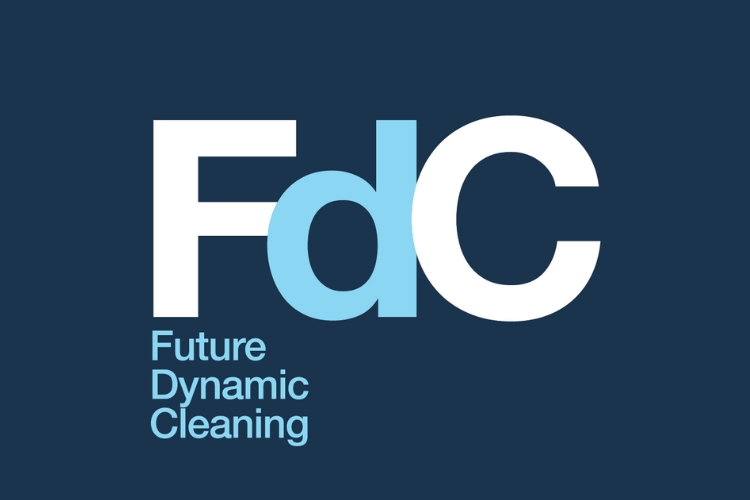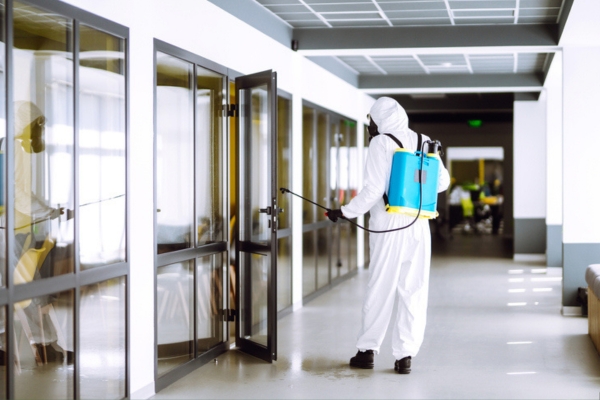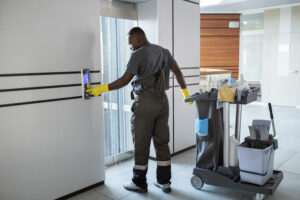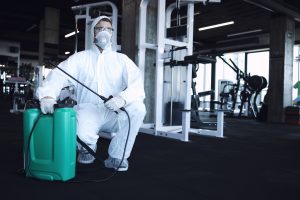What does commercial cleaning mean? Simply put, it’s professional cleaning tailored specifically for businesses and commercial properties—not homes. Whether it’s an office building, a retail shop, or a medical facility, commercial cleaning focuses on maintaining cleanliness, hygiene, and appearance in high-traffic, shared environments. Unlike residential cleaning, which is more personal and limited in scope, commercial cleaning involves specialized equipment, trained teams, and compliance with health and safety standards that matter for both employees and customers.
Understanding the Basics of Commercial Cleaning
What Is Commercial Cleaning?
Commercial cleaning refers to the professional cleaning of commercial spaces like offices, warehouses, retail stores, schools, and more. It includes everything from daily janitorial tasks to deep cleaning services, all designed to keep business environments clean, safe, and running smoothly. These services are typically performed by trained cleaning teams using commercial-grade equipment and products.
Who Needs Commercial Cleaning Services?
Nearly every type of business can benefit from commercial cleaning. Common industries include:
- Office buildings and corporate headquarters
- Retail stores and shopping centers
- Medical offices and healthcare facilities
- Warehouses and industrial spaces
- Schools, colleges, and daycare centers
- Hotels, resorts, and hospitality venues
- Restaurants and commercial kitchens
If your business serves people—or relies on productivity—it likely needs commercial cleaning.
Types of Services Included in Commercial Cleaning
Janitorial Services
Ongoing daily or weekly cleaning that covers basics like trash removal, dusting, sweeping, vacuuming, and general upkeep to keep spaces clean and functional.
Carpet & Floor Care
Deep cleaning, stain removal, and floor treatments like buffing, stripping, waxing, and polishing for carpet, tile, hardwood, and VCT surfaces.
Restroom Cleaning
Sanitizing toilets, sinks, and touchpoints, as well as restocking paper goods, soap, and other hygiene supplies—often one of the most important areas to keep spotless.
Kitchen & Breakroom Cleaning
Cleaning of appliances, countertops, tables, sinks, and shared surfaces where food is prepared or consumed. Helps eliminate bacteria and prevent cross-contamination.
Disinfection & Sanitizing Services
Targeted cleaning using EPA-registered disinfectants to kill germs and viruses on high-touch surfaces like door handles, desks, elevator buttons, and phones.
Power Washing
High-pressure cleaning for building exteriors, sidewalks, parking lots, and loading docks to remove grime, grease, mold, and buildup from outdoor surfaces.
Window Cleaning
Streak-free cleaning of interior and exterior glass for improved natural light, visibility, and an overall professional appearance.
How Commercial Cleaning Differs From Residential Cleaning
Larger Scale and Higher Foot Traffic
Commercial spaces typically deal with far more people than a private home. Offices, stores, and facilities see hundreds—sometimes thousands—of daily visitors. That means more dirt, more germs, and a greater need for regular, thorough cleaning.
Specialized Equipment and Cleaning Solutions
Commercial cleaners use heavy-duty equipment and professional-grade products that aren’t found under your kitchen sink. From auto-scrubbers to electrostatic sprayers, these tools are designed to clean larger areas faster—and more effectively.
Compliance With Industry Regulations
Unlike residential cleaning, commercial cleaning often requires compliance with strict standards set by agencies like OSHA and the CDC. Whether it’s a medical office or a food prep area, the cleaning has to meet health, safety, and sanitation guidelines.
Flexible Scheduling Around Business Hours
Businesses can’t shut down for cleaning. That’s why commercial cleaning teams work early mornings, late nights, weekends—whenever it won’t disrupt your operations. It’s all about keeping things clean without getting in the way.
Why Commercial Cleaning Is Important
Enhances Professional Appearance
First impressions matter. A clean lobby, polished floors, and spotless restrooms tell clients and customers you take your business—and their comfort—seriously.
Improves Employee Health and Productivity
A cleaner workplace means fewer sick days, better air quality, and an overall more comfortable environment. When your team feels good, they work better.
Reduces Spread of Illness and Allergens
Regular disinfecting cuts down on germs, viruses, and allergens that spread through high-touch surfaces. It’s a proactive step toward keeping everyone healthier year-round.
Helps Facilities Meet Safety and Sanitation Standards
Whether you’re in healthcare, food service, or education, cleanliness isn’t optional—it’s part of staying compliant. Professional cleaning helps you meet (and exceed) sanitation standards that protect your people and your business.
What to Look for in a Commercial Cleaning Company
Experience With Your Industry or Facility Type
Not all cleaning companies are the same. You want a team that understands the specific needs of your space—whether it’s a medical office, school, warehouse, or retail store. Industry experience means faster, smarter service that hits the right standards.
Proper Certifications, Insurance, and Background-Checked Staff
Trust and safety matter. Make sure the company is fully insured, follows OSHA standards, and hires trained professionals who’ve passed background checks.
Customizable Service Plans
Your facility isn’t one-size-fits-all—and your cleaning shouldn’t be either. Look for a company that builds flexible service plans around your schedule, space, and needs.
Use of Eco-Friendly or Hospital-Grade Products
Cleaning products should be tough on germs, but safe for people. Ask if the company uses EPA-registered disinfectants or green-certified products, especially if you have staff or customers with sensitivities.
Clear Communication and Reliability
You shouldn’t have to chase down your cleaning company. Choose a partner who communicates clearly, shows up on time, and delivers consistent results every time they clean.
Frequently Asked Questions About Commercial Cleaning
It depends on the type of business and foot traffic. Offices might need daily cleaning, while warehouses or smaller facilities could be fine with weekly service.
Janitorial services are typically day-to-day tasks like trash removal and restocking. Commercial cleaning covers more intensive services like carpet care, disinfection, and deep cleans.
Yes—reputable companies train staff in CDC and OSHA-compliant disinfection techniques, especially for high-touch and high-risk environments.
Absolutely. Most commercial cleaners offer flexible scheduling to avoid disrupting your business operations during the workday.
Not always. Many companies offer both ongoing service agreements and one-time or short-term cleanings based on your needs.
Yes—a clean facility improves health, safety, and professionalism, which directly impacts customer perception and employee satisfaction.
Commercial cleaning isn’t just about appearances—it’s about protecting your people, your reputation, and your day-to-day operations. Whether you run a small office or a multi-site facility, professional cleaning helps create a healthier, more productive space.
If you haven’t reviewed your cleaning plan lately—or don’t have one—now’s the time to explore your options and invest in a cleaner future for your business.




